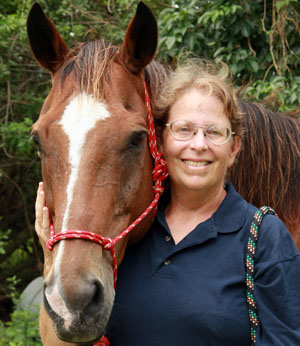TALES FROM THE TRAILS
One of the more interesting and heartbreaking Lunch & Learn lectures this season was given by representatives of Brooke USA in February. Brooke USA, based in Lexington, Ky., was established five years ago to finance programs for the Brooke, the world’s largest international equine welfare charity, which has been helping equines worldwide for more than 80 years.
The organization began in October 1930, when Dorothy Brooke arrived in Cairo with her British cavalry officer husband. There, she discovered several thousand former British war horses left behind after World War I, living and working in horrendous conditions. She began the organization and eventually helped more than 5,000 horses and mules.
There are currently 112 million working horses, donkeys and mules in the developing world, supporting more than 600 million people. These equines carry food, water, families, tourists, building materials, crops, merchandise, medicine and other goods without adequate food, water, rest or veterinary care. They travel through rocky roads, city streets, jungles and deserts, and work in coal mines, stone quarries, brick kilns and factories.
The Brooke is active in Afghanistan, Pakistan, India, Nepal, Egypt, Ethiopia, Kenya, Senegal, Jordan, Guatemala and Nicaragua, and has recently begun a pilot project in Mexico. Through their Small Initiatives Fund grants, they help working equines in other parts of the world.
The Brooke works directly and through partners to do whatever will most improve the welfare of working equines, keeping them free from suffering and better able to support the people who depend on them. They aim to improve the lives of 2 million suffering equines each year through practical, field-based training that is culturally relevant to local needs and resources, with sustainable, innovative methods. By 2021, they hope to increase that to 5 million.
“I’m not only an employee, I’m also a fan. I helped at one of our initiatives in Guatemala this past September. We’re making a huge difference in the lives of people and equines. We hope to help more by engaging U.S. donors,” said Emily Dulin, executive director of Brooke USA and one of the Lunch & Learn presenters.
Kim Wells, another presenter and senior animal welfare advisor for the Brooke UK, stressed the importance of addressing animals’ current suffering and preventing future problems. “The Brooke offers hands-on aid, not just advice,” Wells said. “We create sustainable solutions, work with the local infrastructure, and advocate for changes in government policies. We’re extremely grateful to all our donors and supporters, and especially to Katherine Bellissimo, who invited us here to give this presentation in Wellington.”
Bellissimo, wife of Equestrian Sport Productions CEO Mark Bellissimo, joined Brooke USA’s board of directors in May 2016, after she attended one of their events and became familiar with their mission.
“We need more people to support their work,” she said as she introduced the program. “They help change the global view of how working equines are used and cared for. One important statistic to keep in mind is that each working equine, on average, supports six people. When we help the equines, we also help the families who depend upon them.”
The presentation was well-received, and many in the audience were moved by the slides showing the plight of these poor animals. Ironically, million-dollar jumpers competed just a stone’s throw away, emphasizing the contrast in how different equines get to live their lives.
In 2017, the U.S. is commemorating the WWI centennial, marking the 100th anniversary of our entry into the war. During the three years prior to our entry, the United States shipped approximately 1 million horses and mules to Europe to assist the British and French armies. The first batch arrived in France in October 1914, three months after the war started in Europe. These animals carried men into battle and wounded men back to safety. They carried food, water, medical supplies, ammunition, gun carriages and other items to the front lines. Only 200 came home after the war.
The Brooke wants to honor the 1 million American equines who served in WWI by raising $1 million this year to support the continuation and expansion of Brooke’s sustainable equine welfare programs, also benefiting the people who depend on them.
To learn more about supporting Brooke USA, visit www.brookeusa.org. The web site contains a lot of information, along with photos and short video clips, some of them emotionally hard to view.







